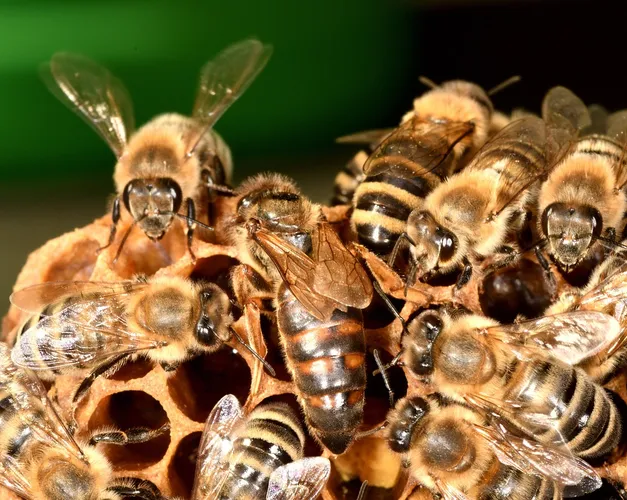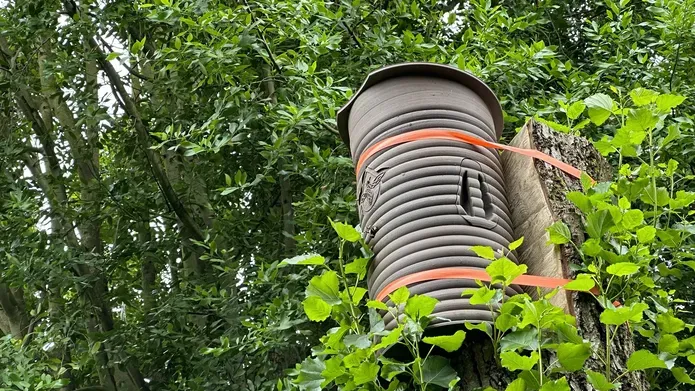Press release
It was meant to bee – 3D-printed log hive proves popular with local bees
A colony of honeybees is generating a buzz at the University of Dundee Botanic Garden after the installation of a 3D-printed wooden log hive
Published on 4 August 2023


Combining indigenous knowledge and technology, the 3D-printed hive was installed in late June and is already helping the Garden to counteract the negative impacts of urbanisation.
The hive at the Botanic Garden is one of only two worldwide, pioneered by the Lacrima Foundation.
Providing bees the opportunity to live in an undisturbed ecosystem in synergy with their seasonal rhythms, the hive adopts a regenerative approach to learn from nature. The natural nest habitat has been facilitated for preservation and renewal of health and resiliency of honeybees, acting as an alternative to the artificial agricultural model of ‘housing’ bees which suit human needs for honey.
The bees in Dundee have already voted with their wings, with a natural colonisation having moved in within five days of installation, demonstrating that the artificial hive supports nest integrity and emulates natural nest parameters for honeybees.
Kevin Frediani, Curator of the Botanic Garden, said, “We are so thrilled to not only host the hive as a public exhibition, but to see it so quickly colonised, providing further evidence that we can truly make a difference as we benefit from learning from nature to help improve our urban environment.
“This project demonstrates how technology and ecologically informed design can be harnessed as an aid to efforts to progress urban rewilding, aligning natural and social systems to enhance and provide habitat for nearby nature that benefits both people and planet.”
Each hive can house up to 50,000 honeybees, creating a sustainable, biodiverse environment to foster the ultimate scenario in which the bees can maximise their reproduction and regeneration.
The new residents in Dundee now benefit from the resilience and levels of health that are known to be present in wild populations of honeybees living in these types of hives.
Vince Moucha, founder of the Lacrima Foundation, said, “We are deeply honoured, grateful and incredibly excited to establish this dynamic partnership with the University of Dundee Botanic Garden.
“Their true understanding of underlying issues, such as habitat loss resulting from the increasing spread of farming and other human activities, parasites and diseases, and the impact of toxic pesticides, aligns perfectly with our biomimicry project.
“This phase successfully concludes our initial pilot programme, and we are currently preparing a crowdfunding campaign on Kickstarter to support the next stage of mass production for our 3D-printed log hives.”
The University's partnership with Lacrima is the latest example of partnership working across the Dundee city landscape that enhance natural features and introduce novel designs that demonstrate urban rewilding to help create healthier, more sustainable, and more ecologically diverse urban ecosystems.
The Botanic Garden has been on a rewilding mission for the past three years as part of a demonstrator pilot to encourage others to help the Rewilding Dundee project.
Looking to adopt more sustainable solutions to maintaining its living collections, the Garden has reduced its dependency on fossil fuel-powered lawnmowers and instead introduced wildflower meadows. Staff at the Garden have also removed the use of pesticides while enhancing the ecological diversity in the habitats it maintains and interprets.
The Lacrima Foundation SCIO is a non-profit, registered charity with its principal office in Edinburgh, Scotland. The Foundation works within the framework of advanced development of environmental protection and improvement, focusing on the conservation and protection of honeybees by combining the ancient method of rewilding and the latest high-tech method of hive monitoring.
The Lacrima Foundation was granted Special Consultative Status by the United Nations ECOSOC, effectively enhancing their engagement in United Nations processes. This positions Foundation at the forefront of global conservation and sustainability dialogues.